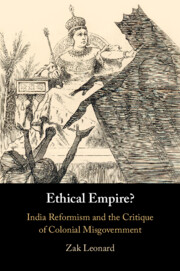Book contents
- Ethical Empire?
- Ethical Empire?
- Copyright page
- Contents
- Figures and Table
- Preface and Acknowledgments
- Association Abbreviations and Key Membership
- Introduction
- 1 The Origins of Reform
- 2 “A Blot on English Justice”
- 3 Public Works, Publicity, and the Search for a New State-Idea
- 4 Reformist Collaboration and the Formation of an Imperial Civil Society
- 5 Anomalous Annexations
- 6 Politicizing Decline
- 7 Radical Reformism and the Challenge of Capitalist Complacency
- Epilogue: Integrating the Empire
- Bibliography
- Index
6 - Politicizing Decline
Reformist Remedies for Deindustrialization
Published online by Cambridge University Press: 05 October 2023
- Ethical Empire?
- Ethical Empire?
- Copyright page
- Contents
- Figures and Table
- Preface and Acknowledgments
- Association Abbreviations and Key Membership
- Introduction
- 1 The Origins of Reform
- 2 “A Blot on English Justice”
- 3 Public Works, Publicity, and the Search for a New State-Idea
- 4 Reformist Collaboration and the Formation of an Imperial Civil Society
- 5 Anomalous Annexations
- 6 Politicizing Decline
- 7 Radical Reformism and the Challenge of Capitalist Complacency
- Epilogue: Integrating the Empire
- Bibliography
- Index
Summary
Chapter 6 examines the ways in which reformers and certain colonial agents were engaging with deindustrialization as an anomalous societal calamity. Many believed that prejudicial tariffs had resulted in the country’s exclusion from a system of “real” free trade, which in turn contributed to the near-collapse of the native handloom-weaving sector. Following initiatives first devised by the Bombay administration – which the Government of India quickly overruled – reformers hoped to stimulate alternative industries such as the cultivation and refinement of free-labor sugarcane. To provide immiserated weavers with agricultural employment on “fair” terms, they further advocated for radical tax reductions, challenged the state’s claim to be sole proprietor of all Indian lands, and publicly revealed its torturous revenue extraction practices. Reformers thereby held that mass poverty in a land as fecund as India could only be the result of European avarice and artificial constraints that inhibited trade.
- Type
- Chapter
- Information
- Ethical Empire?India Reformism and the Critique of Colonial Misgovernment, pp. 189 - 220Publisher: Cambridge University PressPrint publication year: 2023

